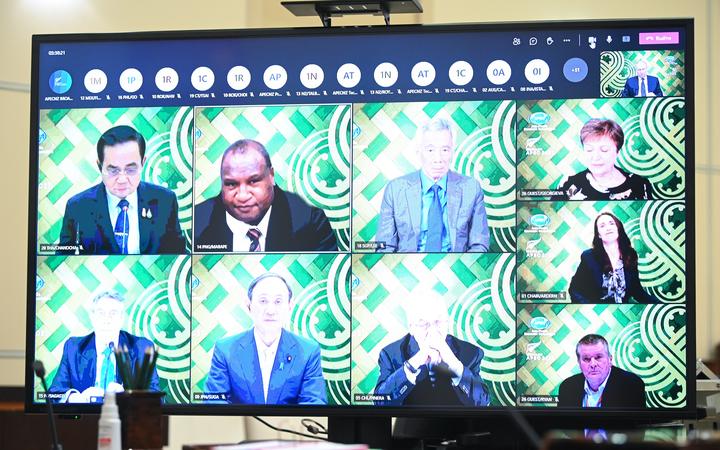Analysis – The special virtual Asia-Pacific Economic Cooperation (APEC) summit was officially referred to as an ‘informal leaders’ retreat on Covid-19′.
From the outset, host Jacinda Ardern dampened down expectations for the meeting, warning reporters not to expect any significant breakthroughs.
In that respect, New Zealand’s Prime Minister was right. A joint statement issued after the meeting included vague commitments to accelerate the production and distribution of vaccines.
There was also agreement on the need to restore international travel links and strengthen supply chains that had been disrupted by the pandemic.
Perhaps surprisingly, three of the biggest and most powerful APEC members – China, Russia and the United States – already agree that there should be temporary intellectual property waivers for Covid-19 vaccines.
But other APEC members, such as Japan and South Korea, don’t – so the consensus position of the 21 economies today could only be to “support global vaccine sharing efforts, and encourage the voluntary transfer of vaccine production technologies on mutually agreed terms”.
The success of the special APEC meeting was that it was being held.
The meeting only added to Ardern’s growing diplomatic reputation as a consensus-builder.
It is a role she has been gradually developing since becoming prime minister in 2017.
Before the outbreak of Covid-19, Ardern maintained a busy international travel schedule.
One of her first foreign trips in 2017 was to the APEC leaders’ meeting in Vietnam – the last in-person APEC meeting to be attended by both the US and Chinese presidents.
Ardern made a high-profile appearance at the UN General Assembly in 2018, when she took her newborn baby with her into the meeting.
Those occasions gave Ardern the chance to make an initial impression on the world stage.
Her compassionate response to the Christchurch mosque attacks in 2019 and the subsequent Christchurch Call initiative saw Ardern burnish her diplomatic credentials.
Yesterday’s APEC meeting shared some similarities with Ardern’s Christchurch Call strategy. As with the call’s narrow focus on the removal of terrorist and violent extremist material from the Internet, the APEC event intentionally limited its focus to the current global challenge of Covid-19.
Ardern and Emmanuel Macron, the other co-leader of the initiative, have resisted the temptation to turn the Christchurch Call into a general discussion about regulation of the Internet – which would immediately create divisions amongst its extremely varied group of signatories.
By keeping its narrow focus, the Christchurch Call’s membership has steadily grown from its original 17, mainly Western supporters. Now, 55 countries from every major world continent are signatories.
 APEC leaders at the online meeting yesterday. Photo: Getty Images
APEC leaders at the online meeting yesterday. Photo: Getty Images
Significantly, the US signed up to the agreement in May. At the time, Ardern and Macron co-hosted a virtual summit not unlike yesterday’s APEC event – with the participation of US Secretary of State Antony Blinken and many other world leaders.
Like the Christchurch Call, yesterday’s APEC meeting reflected Ardern’s brand of pragmatic, broad-church diplomacy.
In a speech earlier this week, Ardern cited “inclusivity: that all countries in the region can participate” as one of New Zealand’s bedrock values.
Yesterday’s APEC retreat brought Xi Jinping, Vladimir Putin and Joe Biden together on the same video call.
Gathering the presidents of China, Russia and the United States in itself is an achievement.
While the origins of the pandemic have become politicised, the coronavirus response serves as a unifying common denominator – especially given the current spread of new variants and the slow vaccine rollout for many APEC members.
Amidst escalating geopolitical conflict between China and the West, yesterday’s APEC meeting was a confidence-building exercise.
It was a reminder that despite the current heightened tensions, there are some underlying commonalities that everyone can agree on.
It could be the start of something more.

Leave A Comment